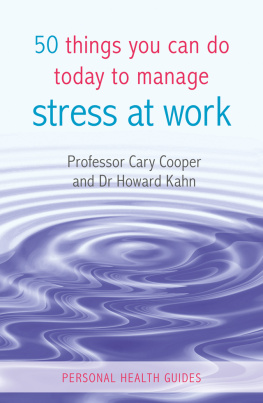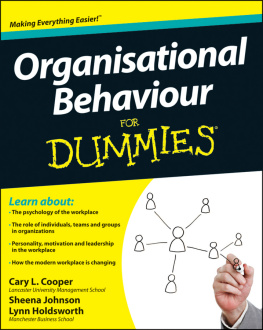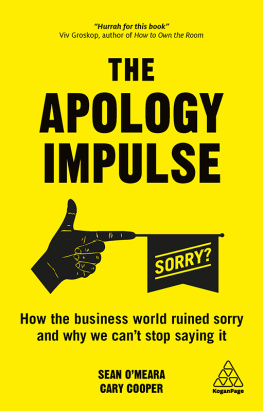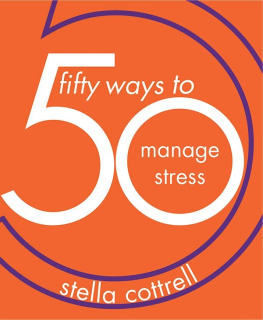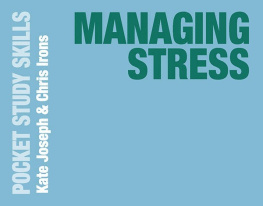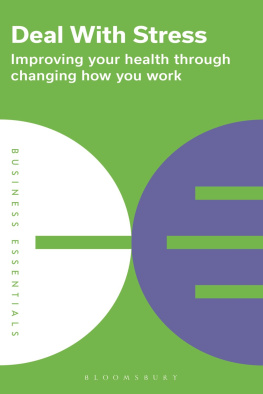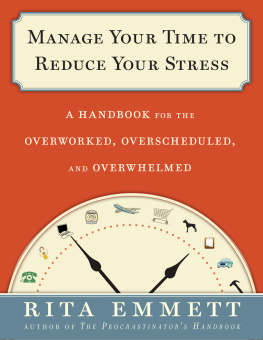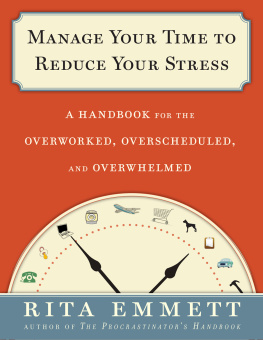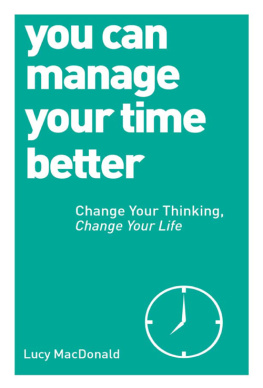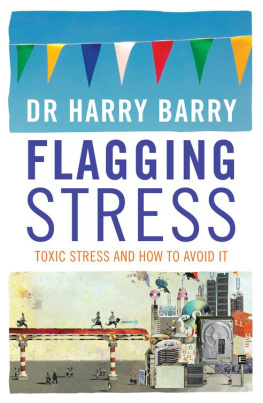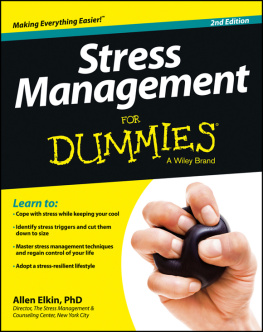50 things you can do
today to manage
stress at work
Professor Cary Cooper
Dr Howard Kahn
PERSONAL HEALTH GUIDES
50 THINGS YOU CAN DO TODAY TO MANAGE STRESS AT WORK
Copyright Cary Cooper and Howard Kahn 2013
All rights reserved.
No part of this book may be reproduced by any means, nor transmitted, nor translated into a machine language, without the written permission of the publishers.
The right of Cary Cooper and Howard Kahn to be identified as Authors of this work has been asserted by them in accordance with the Copyright, Designs and Patents Act 1988
Condition of Sale
This book is sold subject to the condition that it shall not, by way of trade or otherwise, be lent, re-sold, hired out or otherwise circulated in any form of binding or cover other than that in which it is published and without a similar condition including this condition being imposed on the subsequent publisher.
Summersdale Publishers Ltd
46 West Street
Chichester
West Sussex
PO19 1RP
UK
www.summersdale.com
Printed and bound by CPI Group (UK) Ltd, Croydon, CR0 4YY
eISBN: 978-0-85765-845-6
Substantial discounts on bulk quantities of Summersdale books are available to corporations, professional associations and other organisations. For details contact Nicky Douglas by telephone: +44 (0) 1243 756902, fax: +44 (0) 1243 786300 or email: .
Disclaimer
Every effort has been made to ensure that the information in this book is accurate and current at the time of publication. The author and the publisher cannot accept responsibility for any misuse or misunderstanding of any information contained herein, or any loss, damage or injury, be it health, financial or otherwise, suffered by any individual or group acting upon or relying on information contained herein. None of the opinions or suggestions in this book is intended to replace medical opinion. If you have concerns about your health, please seek professional advice.
To my grandchildren Jai and Isabella, who I hope will manage stress better than I did when I was young!
(Cary)
To my wife Valerie and our daughter
Jacqueline, hoping that they will not be
stressed by anything at work or home.
(Howard)
Acknowledgements
To all my former PhD students who supported me
and kept me stress free, including Howard!
(Cary)
To Valerie, my wife, and Jacqueline, my
daughter, and to Ray and Marjorie
they know about stress at work.
(Howard)
Other titles in the Personal Health Guides series include:
50 Things You Can Do Today to Manage Stress
50 Things You Can Do Today to Increase Your Fertility
50 Things You Can Do Today to Manage Arthritis
50 Things You Can Do Today to Manage Back Pain
50 Things You Can Do Today to Manage Eczema
50 Things You Can Do Today to Manage Fibromyalgia
50 Things You Can Do Today to Manage Hay Fever
50 Things You Can Do Today to Manage IBS
50 Things You Can Do Today to Manage Insomnia
50 Things You Can Do Today to Manage Migraines
50 Things You Can Do Today to Manage Menopause
Contents
Authors Note
When I was working as a social worker in downtown Los Angeles, I worked with underprivileged black people in South Central LA district and with the poor and homeless in the city centre. I saw real poverty and deprivation, but most of all I saw the daily grind and stress in peoples lives. For most, they didnt have the coping strategies to deal with the enormous financial, social and psychological problems they faced. This had a lasting impact on me from that moment on. While I was working as a social worker, I was also studying for my MBA, and I decided that being an accountant or corporate lawyer was not going to be a personally fulfilling career for me, that I wanted to make some kind of difference in peoples lives. I then modified my course to concentrate on organisational psychology and behavioural science, and moved gradually into workplace health and occupational stress. Slowly and gradually this led me inevitably to researching what work does to people, how it stresses them and/or enhances their wellbeing and health. I have since then carried out research on a variety of occupations, from teachers to pilots to women managers to doctors to international interpreters. It is this collective wisdom, developed over the years with dozens of my PhD students that this book is based on. I am pleased to say that Howard Kahn was one of these students, who ended up a friend and valued colleague over the years, and without whom I could not have done this book.
Professor Cary Cooper
I first became familiar with stress when I worked in the City of London beside those who buy and sell currency, Eurobonds, gilts, and trade in stocks, fixed institutional sales, swaps, and so on. They were (and still are) well paid, but suffered from a great deal of stress. As a result they consumed much alcohol, indulged in dangerous behaviours, and were burnt-out by the time they were in their late 30s. I asked myself what I could do to help them. Since then, I have been working with people in more ordinary occupations, and it is clear that many of them are stressed by the situation they find themselves in at work. The aim of this book is to help people who suffer stress at work, which, in an era of globalisation, redundancies, longer hours, and concerns about the future, is becoming more stressful than ever.
Dr Howard Kahn
Chapter 1
About Stress at Work
Do you suffer from stress at work? Dont worry - youre not alone. The International Labour Organization, based in Geneva, Switzerland, has been concerned about work-related stress for many years and claims it is one of the most important issues in many countries and in different kinds of workplaces. The outcomes of stress can include circulatory and gastrointestinal diseases, other physical problems, psychosomatic and psychosocial problems, and low productivity. At an organisational level, the UK Chartered Institute of Personnel and Development estimates stress costs industry 601 per employee.
The purpose of this book is to help you realise the actions you can take to manage and control stress at work, both from an individual and management point of view. The book will also explain the methods you can use to cope with stress at work - such as deep breathing or exercise - and will show you how to change the circumstances (whether at work or not) that may be causing your stress.
The first thing we will do is show what stress is and the major causes of stress at work. We will then suggest what you can do - as an individual, supervisor or manager - to deal with these issues. In some cases we will also show how the stress can arise.
What is stress?
What happens when you are under stress at work (for instance when you have too much work to do, a difficult boss, unpleasant coworkers, no prospects for promotion, fear of losing your job, etc.)?
- The blood in your body is redirected from your skin (which is why your face may appear pale) and your organs, and sent to the muscles and brain.
- The glucose and fatty acids you naturally have stored in your body are transferred into your bloodstream so you will have energy to deal with the threat you are under.
- You become much more alert - your hearing and vision are greatly improved.
- Your immune system is weakened.
Overall, chemicals such as adrenaline are produced, your heart rate goes up, your blood vessels dilate, your breathing becomes faster, you sweat more, your metabolism slows down, and the production of oestrogen, androgen and other sex hormones are reduced.

